Natural resource and conservation updates in Angola and South Africa
On Wednesday, April 7, Italian energy company ENI announced plans to invest $7 billion in Angola over a four-year time horizon. The investment in Angola will focus on enhancing oil and gas exploration, production, and refining, as well as building a solar power plant, which the company expects to become operational by 2022. While the solar power potential of Africa is enormous, in recent months, the International Monetary Fund (IMF) found that solar power and other renewable energy sources are underutilized in the continent’s energy mix. However, the IMF projects renewable energy, particularly solar, will provide a significant majority of Africa’s energy mix by 2100 due to its abundance, cost parity with fossil fuels, and advances in energy storage.
In other sustainability news, backers of a contentious proposed development in South Africa’s Limpopo region, in which the Waterberg UNESCO Biosphere Reserve is located, are at odds with sustainability and public health proponents, as plans for the Musina-Makhado Energy-Metallurgical Special Economic Zone (EMSEZ), a nearly 20,000-acre industrial facility with 20 steel and various other metalworking plants, inches forward. The project is projected to emit 1 billion tons of carbon dioxide, more than double the country’s current annual emissions, in addition to other industrial pollutants. However, the industrial multibillion-dollar megaproject is also projected to create 54,000 jobs for South Africa, where lingering economic fallout of the COVID-19 pandemic has exacerbated the country’s already high unemployment.
Transition in Niger; elections in Djibouti, Benin, and Chad
On Friday, April 2, Niger celebrated its first democratic transfer of power with the inauguration of newly elected President Mohamed Bazoum; notably, Niger has seen four successful coups since its independence from France in 1960. Still, the West African country’s transition did not go perfectly smoothly: Just days before the inauguration, a military unit tried to take the presidential palace in a coup attempt but was rebuffed by security forces. Importantly, the Mo Ibrahim Foundation awarded now former President Mahamadou Issoufou, the country’s first democratically elected president, the Ibrahim Prize for Achievement in African Leadership earlier this year for his leadership and for stepping down after two terms, in accordance with the constitution.
On Friday, April 9, Djibouti held its presidential election, with President Ismaïl Omar Guelleh looking for a fifth term. Given calls for a boycotts of the election by opposition parties, experts predict Guelleh will easily secure a win. Though the country is small, its location on the Strait of Bab-el-Mandeb, makes it an important security partner for many global powers. In fact, the United States, China, Japan, Italy, and France, among others, have military bases in the country.
Also this week, protests against President Patrice Talon’s intention to stand in Benin’s presidential election next week spread, culminating in at least one death. Notably, Talon, who was elected in 2016, has backtracked on his promise to step down after five years to avoid what he calls “complacency.” Critics warn that Benin’s democracy—which was undergirded when former President Thomas Boni Yayi stepped down in 2016 after two terms—stands on shaky ground. In 2018, his government also pushed through reforms that disqualified all opposition parties from running in 2019. Benin heads to the polls on Sunday, April 11.
Chad will also hold a presidential election this Sunday. Tensions continue to simmer in the run-up to the election: On Friday, according to Reuters, “Chad’s interior ministry [said] it had arrested several people after uncovering a plot to assassinate prominent political figures and bomb polling stations and the electoral commission headquarters ahead of Sunday’s presidential election. … Politicians were among those arrested for planning the killings of opposition and civil society leaders in an attempt to frame the government, the ministry said in a statement late on Thursday.” Also on Thursday, Human Rights Watch warned that preelection crackdowns on those opposing five-term President Idriss Déby have led to arrests of and violence toward protestors. Deby, who has been in power since 1990, faces six candidates after the country’s supreme court ruled seven others were ineligible to run. He is expected to win given a patchwork of opposition boycotts.
COVID-19 vaccination efforts continue, but financing challenges and food insecurity loom
According to the Africa Centers for Disease Control and Prevention, as of this writing, there have been 4,317,900 confirmed cases of COVID-19 across all countries in Africa. While the first dose administered in Africa was on March 1, vaccine rollout has been slow: Only about 0.9 percent of the African population has been vaccinated, the slowest rate of any continent.
Experts had predicted that a vaccine rollout in Africa would face considerable challenges, including in access, cost, and delivery, which the World Health Organization confirmed this week. Moreover, questions around the effectiveness of the Oxford-AstraZeneca vaccine against the South African variant have also created complications in that rollout. To facilitate access to affordable vaccines, according to the BBC, most of Africa has signed up for the COVAX program—a program co-led by CEPI, Gavi, UNICEF, and the World Health Organization to “accelerate the development, production, and equitable access to COVID-19 test, treatments, and vaccines.” In addition, some countries are purchasing vaccines separately or have had vaccines donated to them from China, Russia, and India. (For details on challenges facing the rollout, see the Foresight Africa 2021 viewpoint, “Navigating the complexities around a COVID vaccine in Africa,” by Uwagbale Edward-Ekpu).
Beyond the immediate health threats of the virus, the crisis continues to create problems for the region when it comes to financing, corruption, and food security. For example, the IMF’s April 2 approval of $2.34 billion in new financing arrangements to help Kenya address COVID-19 and its debt vulnerabilities has been met with concerns from Kenyan citizens over accountability. Earlier this week, al-Jazeera also reported that confusion and profiteering, among other problems, have hampered the country’s vaccine rollout plans. In addition, late last week, the country banned the private import of vaccines, citing fears over counterfeits.
COVID-19 has also exacerbated food security within Africa: In fact, in a situation report from late last year, ReliefWeb notes that “COVID-19 has confined populations, restricting their movement thus limiting their ability to find alternative or additional income and food sources.” Now, according to Reuters, 27.3 million people in the Democratic Republic of the Congo (DRC) are suffering from acute hunger because of localized conflict and the impact of COVID-19. Indeed, the areas that are experiencing the worst levels of food insecurity are in the eastern and central provinces, all of which are also affected by conflict. Similar trends are occurring in the Sahel region as well.
The Brookings Institution is committed to quality, independence, and impact.
We are supported by a diverse array of funders. In line with our values and policies, each Brookings publication represents the sole views of its author(s).
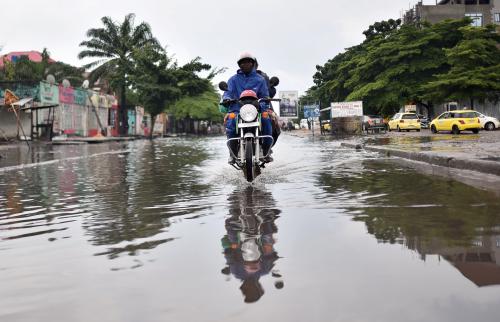
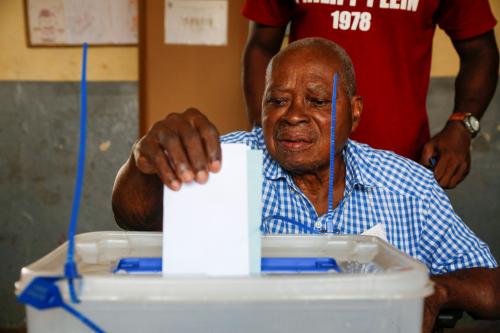

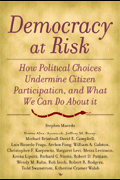



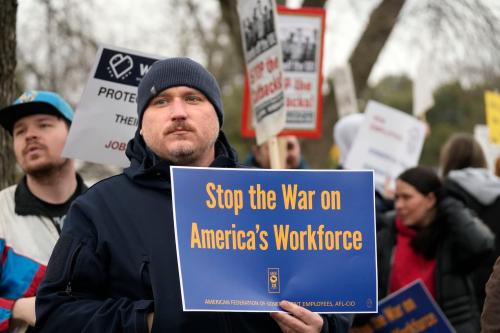

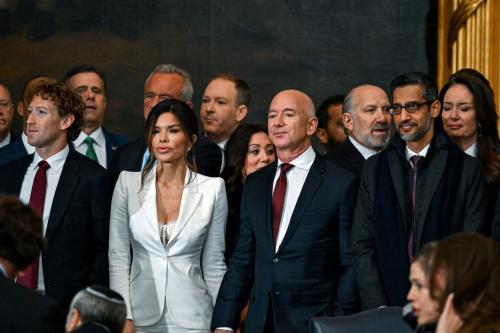
Commentary
Africa in the news: Updates on natural resources, and politics in Niger, Djibouti, Benin, and Chad
April 10, 2021